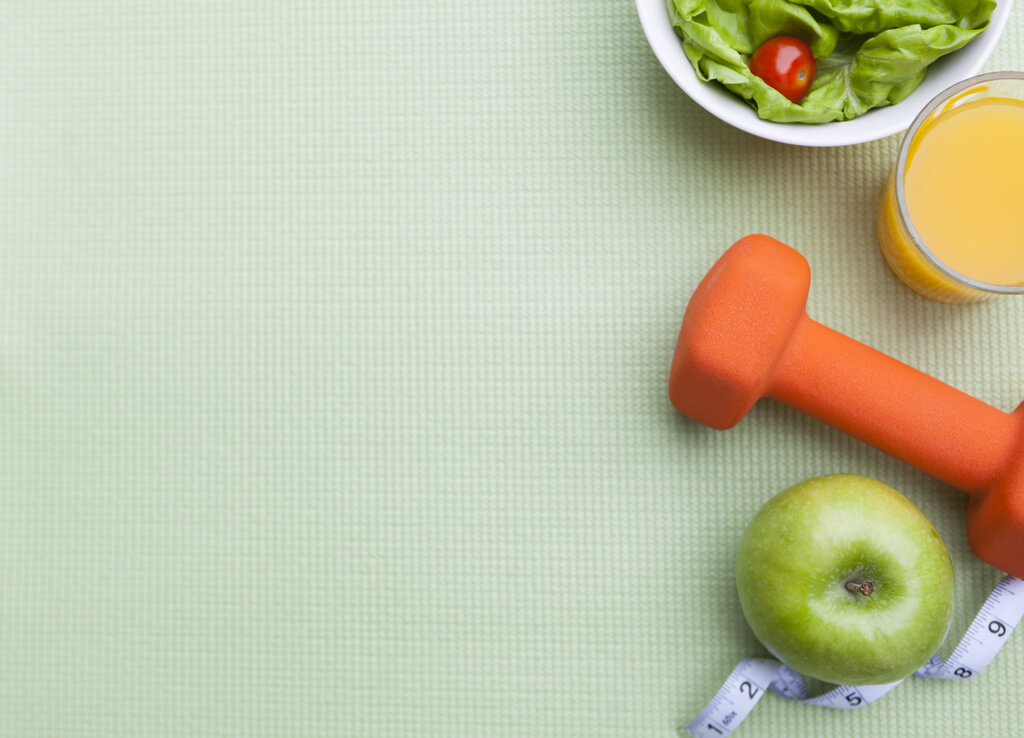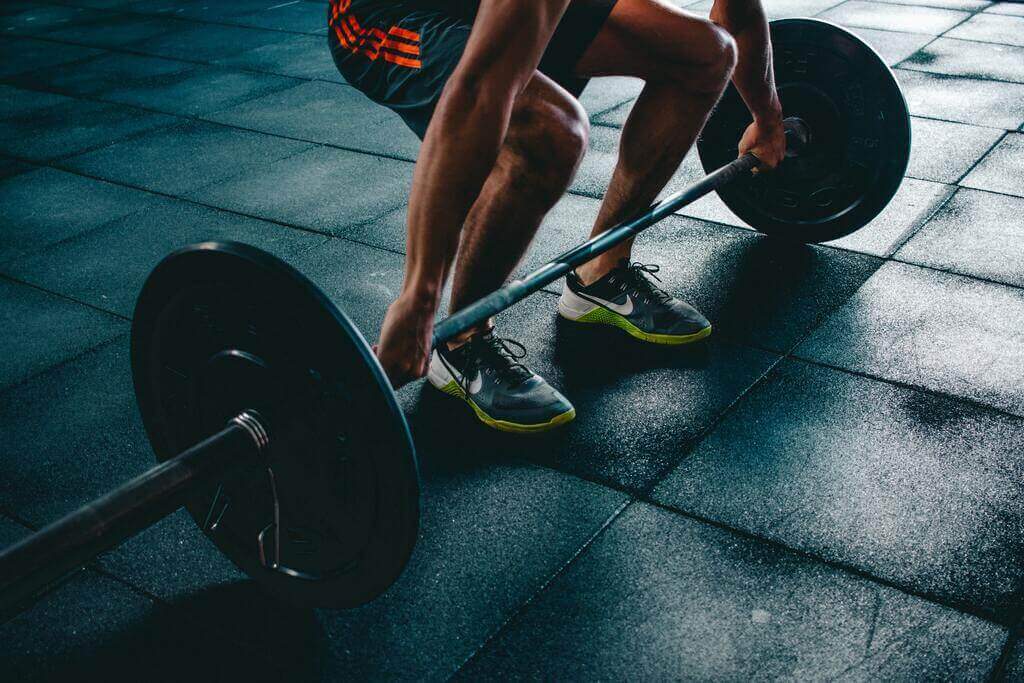How to use the calorie calculator for muscle building
March 7, 2022- Fitness
- Healthy lifestyle
- Nutrition
- Sport

If you want to build up muscles, you need plenty of calories. Because carbohydrates, fats and proteins provide energy and support regeneration. But how much is plenty? How many calories does your body actually need to build muscle? We will now take a closer look at these very questions and also clarify what the ideal diet for sport looks like and how the calorie calculator can help you.
Übersicht
How to build muscle successfully
Building muscle is an important goal for many athletes. You become stronger, get closer to the desired beach figure and feel good in your skin. But how do you build muscle in the first place? And what role does the calorie calculator play?
When you talk about building muscle, you talk about hypertrophy. Muscle fibre hypertrophy, to be precise. This is when the cross-section of the muscles increases, making the muscles stronger and the body look more athletic. So much for the definition of the term.
But how does muscle growth happen? And which factors are particularly important for building muscles?
Hypertrophy – how to make your muscles grow
In order to grow your muscles, you need two coordinated factors. Training that provides sufficient stimuli. And regeneration, during which your body recovers and strengthens. By the way, your diet is extremely important for regeneration.
Effective training is always adapted to your current fitness level. If you are just starting out, strength training with your own body weight can be sufficient. A few push-ups, lunges or squats are sufficient stimuli for beginners.
If you are more advanced, you can use weights. Barbells, dumbbells or strength training machines can be of good service.

However, it is important not to overdo it. Targeted training breaks or a suitable coordination of training and recovery are extremely important. Two to four training sessions a week, for example, can ensure this.
A third important factor is nutrition. Let’s take a closer look at what you should pay attention to.
Macronutrients – calorie-rich energy suppliers
When it comes to ideal nutrition in sports, you should know the following. First, there are macronutrients. These are the nutrients that contain calories. On the other hand, there are micronutrients. These have no calories, but are important for many functions in the body.
Let’s start with the macronutrients. This group includes carbohydrates, fats and proteins. While carbohydrates and fats serve primarily as energy suppliers, the body uses protein as building material.
However, the three macronutrients have different numbers of calories and fulfil different functions:
| macronutrient | calories per gram | most important functions in the body |
| fats | 9 kcal per gram | Largest energy supplier Utilisation of fat-soluble vitamins Protection for organs |
| carbohydrates | 4 kcal per gram | Fast energy supplier Important for brain and muscles |
| Proteine | 4 kcal per gramm | Building material for tissue Transport function in the blood and cells |
Micronutrients – calorie-free miracles
Unlike macronutrients, micronutrients contain no calories and therefore no energy. However, their functions are just as important.
The micronutrients at a glance:
- Vitamins
- Fat-soluble vitamins (A, D, E & K)
- Water-soluble vitamins (B & C)
- Minerals
- Bulk elements (magnesium, calcium, etc.)
- Trace elements (iron, zinc, etc.)
The functions of micronutrients range from a resilient immune system to skin renewal. In order to build muscles and be able to train regularly for this, you should pay attention to a strong immune system.

In addition, you should pay special attention to which vitamins and minerals you need as an athlete. Iron, magnesium and vitamin D play a particularly important role.
Calorie calculator – the must-have for muscle building?
But how many calories does the body need to build muscle? This question is not so easy to answer. In fact, a number of factors have an influence on your calorie requirements. Fortunately, there are calorie calculators that take all these factors into account.
The only thing you have to do is enter the necessary data. This usually includes your height, your current weight and your age.
The calculated amount of calories often represents your basal metabolic rate. Sometimes, however, the power metabolism is already included. We will now take a closer look at the difference.
Basal metabolic rate or power metabolic rate – what does the calorie calculator calculate?
Basically, the difference between basal metabolic rate and power metabolic rate is easy to explain. As the name suggests, the basal metabolic rate is the amount your body needs in any case.
For most people, the basal metabolic rate is around 1,800 to 2,200 calories. This means that your body needs just this amount of calories to maintain all bodily functions. All this is assuming you don’t exercise.

However, as this will be the case, you will need a second factor to determine your calorie requirement. The performance metabolism. Here, too, the name already indicates the function.
The performance metabolism describes the amount of calories that your body needs in addition. It depends on how physically active you are. Since it would be very cumbersome to calculate each individual physical activity, no matter how small, there are the so-called PAL values.
The power metabolism as a PAL value:
| PAL value (activity level) | description |
| 1.2 to 1.3 | exclusively sedentary or recumbent activity |
| 1.4 to 1.5 | exclusively sedentary with little or no strenuous leisure activity |
| 1.6 to 1.7 | sitting, sometimes standing and walking with little or no strenuous leisure activity |
| 1.8 to 1.9 | mainly walking or standing work |
| 2.0 to 2.4 | physically strenuous occupational work or very active leisure activity |
It’s best to be honest with yourself and match yourself to the appropriate description. Now you just have to multiply your basic requirement by your PAL value and you will get your daily calorie requirement.
However, always make sure which value was calculated for you in the calorie calculator. Otherwise it can happen that you include the performance metabolism twice.
Our Verival calorie calculator, for example, calculates your individual daily requirement based on the information you enter. Including basal metabolic rate and performance metabolic rate!
How to use the calorie calculator for targeted muscle building
If you want to build muscle and get stronger, there is one more thing you should consider. The calorie calculator usually calculates your so-called maintenance calories.
Maintenance calories are the amount of calories you need to maintain your current weight. However, if your goal is to gain weight in the form of muscle mass, you should add a little more calories. Especially if you are already advanced.
An extra 200 to 400 calories on top of your calculated daily requirement should be enough in most cases. It is best to weigh yourself daily and average out your weight gain. This way you can always adjust your calories and avoid unwanted weight gain due to fat.
Sample calculation with our Verival calorie calculator:
| gender | age | height | weight | activity level | Tagesbedarf |
| male | 24 | 182 cm | 78 kg | moderate activity (2 to 3 x sports per week) | 2 884 kcal + 300 kcal = 3 184 kcal |
| female | 35 | 168 cm | 65 kg | Low activity/sitting (1 to 2 x per week sporting activity) | 1910 kcal + 300 kcal = 2 210 kcal |
If you use your BMI to classify your weight, you should be careful. The BMI of strength athletes and bodybuilders can be somewhat misleading. Because of the above-average muscle mass, you will quickly be classified as overweight as a muscular athlete, even though your body fat percentage is perfectly fine.
These foods help build muscle
In order to reach the desired daily requirement calculated by the calorie calculator, you should choose suitable foods. Ideally, these foods should be nutrient-dense and high enough in calories to meet your daily requirements.
One food that is particularly suitable is oats. Oat flakes or bran are rich in complex carbohydrates and vegetable proteins. Together with the natural fibre they contain, oats provide plenty of energy at breakfast.
In the form of porridge or overnight oats, oat flakes are quick to prepare and the ideal sports breakfast for your daily sports routine. If you top your porridge with fresh fruit, you get an optimally balanced breakfast thanks to the vitamins and minerals it contains. Nuts or seeds can provide an extra portion of protein.
Conclusion: The calorie calculator helps you build muscle
Of course, you don’t necessarily need a calorie calculator to build muscle. Of course, you can also just eat what you want and check the scales every day. However, it may take a while until you have determined your individual needs.
However, since calorie calculators are very simple and provide relatively accurate results, you should at least consider them. However, you should be aware that the values do not correspond 100 per cent to your individual values. However, they are fairly accurate reference values that can serve as a basis.
In this way, you will find your actual calorie requirements more quickly and can gain weight, lose weight or simply maintain your weight in a more targeted and healthy way.














